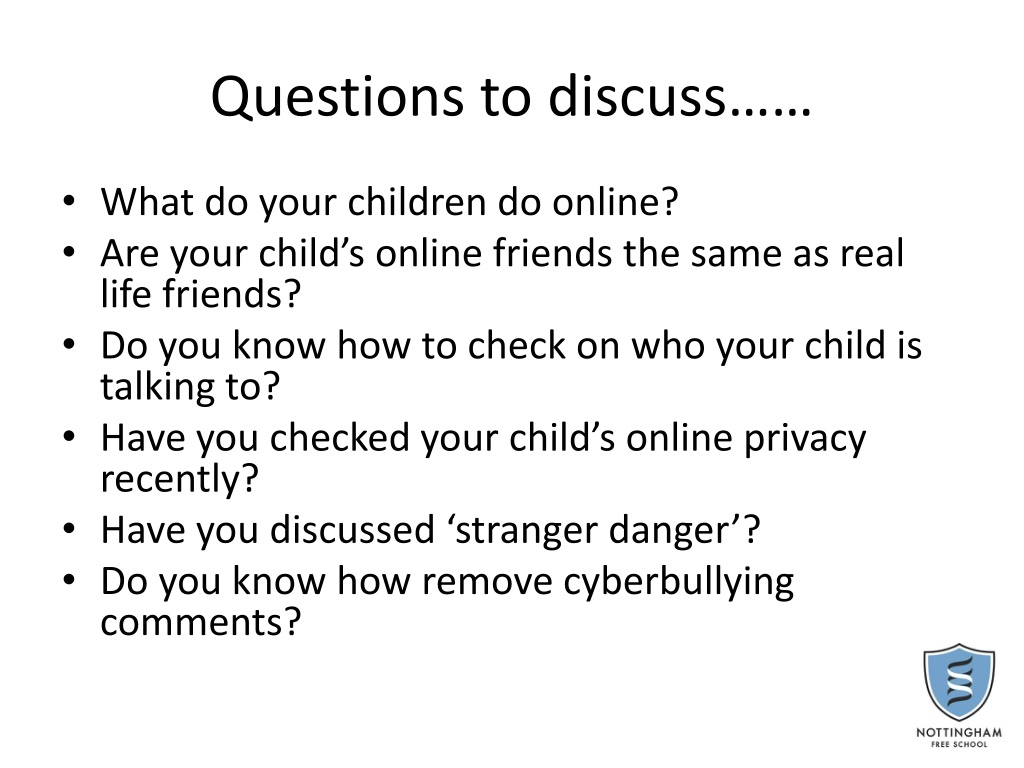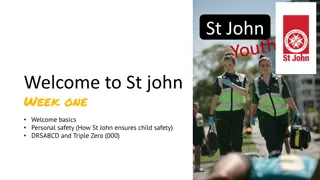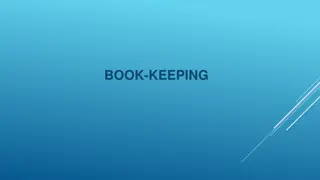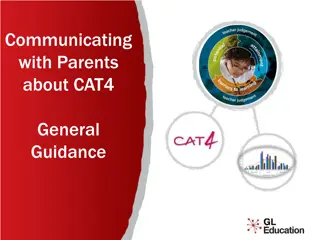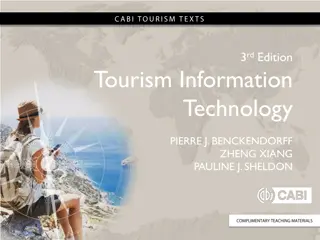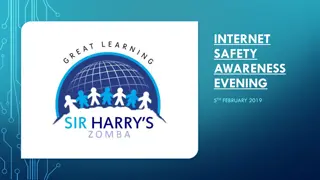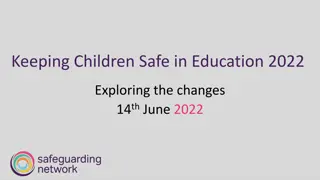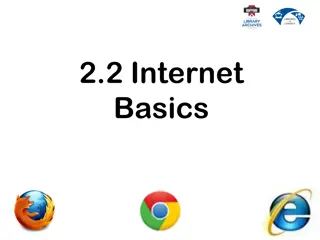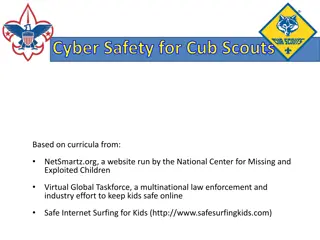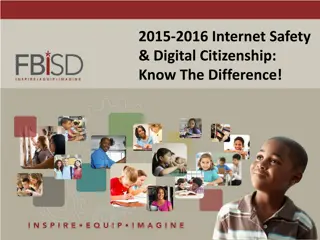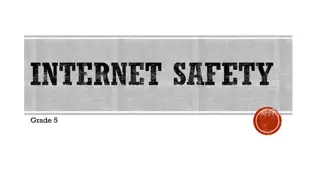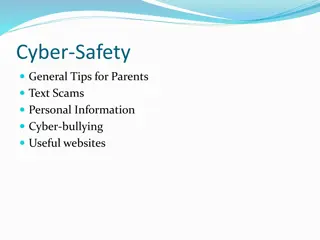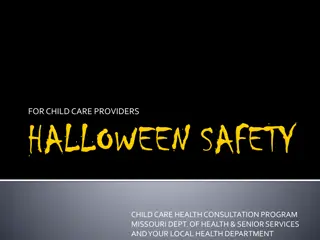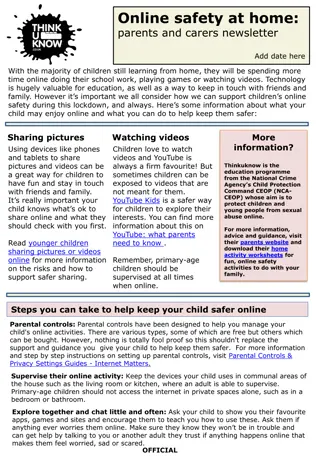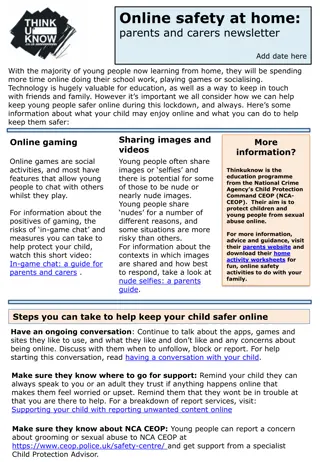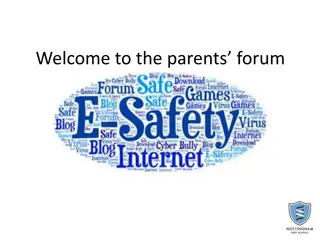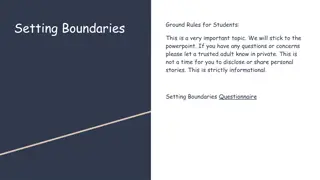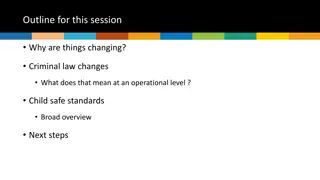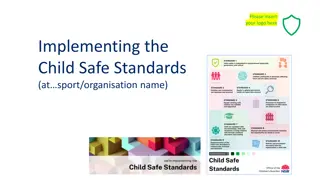Internet Safety Tips for Parents: Keeping Your Child Safe Online
The online world poses various risks for children, from cyberbullying to exposure to inappropriate content. Parents need to be vigilant and proactive in ensuring their child's safety while navigating the internet. Topics such as monitoring online activities, discussing stranger danger, and recognizing signs of cyberbullying are crucial discussions to have with your child. Understanding the facts about children's online behavior and the potential dangers they may encounter is essential for safeguarding their well-being in the digital age.
Download Presentation

Please find below an Image/Link to download the presentation.
The content on the website is provided AS IS for your information and personal use only. It may not be sold, licensed, or shared on other websites without obtaining consent from the author. Download presentation by click this link. If you encounter any issues during the download, it is possible that the publisher has removed the file from their server.
E N D
Presentation Transcript
Questions to discuss What do your children do online? Are your child s online friends the same as real life friends? Do you know how to check on who your child is talking to? Have you checked your child s online privacy recently? Have you discussed stranger danger ? Do you know how remove cyberbullying comments?
Facts Social media Cyber-bullying Keeping your child safe School policy
Internet facts The internet is a fantastic tool and an ever increasing part of our daily lives. Children are likely to experience/participate in: Using search engines Sharing images and watch videos Using forums and social networking sites Playing games (alone or with others) Chatting to others online or through mobile apps
Internet facts Children spend an average of 12 hours per week online 92% of teenagers go online daily and 24% say they go online almost constantly Over 70% of teenagers own a smartphone 91% said their preferred method of going online was on a smartphone A typical teen sends and receives 30 texts daily Usage of social networking sites increases as children get older
Internet facts Keep in touch with friends and family New learning Help with homework Be creative Friends and contact with people they don t know Inappropriate content including pornography Inappropriate age-related content Sharing personal information Grooming and sexual abuse Accruing debts and gambling
Social media Chat rooms, social network sites, group chats, group games Quiz time! http://www.net-aware.org.uk/
Social media Chat rooms, social network sites, group chats, group games 50% have seen sexual, violent and other adult material on social media sites, apps and games 78% of children reported that they had joined social media sites before reaching the specified minimum age Top five 5 sites where young people reported seeing inappropriate content: While young people rated Chatroulette, Omegle and Tumblr as high risk for sexual content, parents rated them as low risk Sickipedia (100% of children surveyed) Chatroulette (92%) Omegle (89%) Ask.fm (88%) Yik Yak (74%). http://www.net-aware.org.uk/
New apps/websites to be aware of.. Blue Whale - originated in Russia. It encourages self harm for 50 days then committing suicide on the last day. Young people carve a whale on their forearm. In Hampshire, there have been 2 completed suicides and 2 very near misses. Yellow a new dating app for under 18 s. Sayat.me - is very similar to ask.fm and is having some unpleasant outcomes. People can sign up with facebook, twitter or skype.
Sexting also known as trading nudes, dirties and pic for pic The sharing of inappropriate or explicit images or written messages online or through mobile phones. Sending pictures and inappropriate content has become normal teenage behaviour. It is seen as flirting by children and teenagers who feel that it is part of normal life. Leaves people vulnerable to bullying and harm No control over the sharing of images The dangers Can have long term harmful effects It s illegal http://www.nspcc.org.uk/preventing-abuse/keeping-children-safe/sexting/
Sexting Four steps to trouble 1: Sarah, 14, takes a sexual photo of herself on her camera-phone and sends it to her boyfriend James, 15. Sarah is now potentially guilty of distributing child pornography. James is potentially guilty of possession of child pornography 2: Sarah dumps James. Out of revenge James sends the photo to his friends at school. James is now guilty of distributing - and his friends of possession - of child pornography. Sarah is embarrassed as a sexual photo of herself circulates school 3: James s friend uploads the photo to a social networking profile, where his photos are visible to the public. James is in breach of website terms and guilty of distributing child pornography 4: Paedophiles browse profiles with loose privacy settings and find the image of Sarah. Sarah unwittingly becomes the subject of child pornography for distribution among strangers and paedophiles
What the law says on sexting A young person is breaking the law if they: take an explicit photo or video of themselves or a friend share an explicit image or video of a child, even if it s shared between children of the same age possess, download or store an explicit image or video of a child, even if the child gave their permission for it to be created. However, as of January 2016 in England and Wales, if a young person is found creating or sharing images, the police can choose to record that a crime has been committed but that taking formal action isn't in the public interest. Crimes recorded this way are unlikely to appear on future records or checks, unless the young person has been involved in other similar activities which may indicate that they're a risk.
ZIPIT APP - https://www.childline.org.uk/info-advice/bullying- abuse-safety/online-mobile-safety/sexting/zipit-app/
Cyber-bullying Bullying that happens online, via social networks and on mobile phones. It is usually repeated over a period of time and the victim can feel that there is no escape because it can happen wherever they are and at any time. http://www.nspcc.org.uk/preventing-abuse/child-abuse-and-neglect/bullying- and-cyberbullying/
Cyber-bullying Talk about cyberbullying (and bullying) Know how not to react Know who to go to for help Teach them how to stay safe online http://www.nspcc.org.uk/preventing-abuse/child-abuse-and-neglect/bullying- and-cyberbullying/
Keeping your child safe what do you do now? Talk about it regularly Go online together Know who your child is friends with online Set rules and boundaries Use parental controls Check content is age-appropriate Ensure your child understands privacy setting and how to report it
Conversation starters. Ask your children to tell you about the sites they like to visit and what they enjoy doing online. Ask them about how they stay safe online. What tips do they have for you, and where did they learn them? What is OK and not OK to share? Ask them if they know where to go for help, where to find the safety advice, privacy settings and how to report or block on the services they use. Encourage them to help. Perhaps they can show you how to do something better online or they might have a friend who would benefit from their help and support. Think about how you use the internet as a family. What could you do to get more out of the internet together and further enjoy your lives online?
Family agreements. A family agreement is a great way to start a conversation with your whole family about how you all use the internet, and discuss together how to behave in a positive way when online at home, at school, at friend s houses etc. Bear in mind it is difficult to have complete control over your family s internet usage, however a family agreement is a great way to set clear expectations for positive and safe internet use.
Keeping your child safe The NSPCC website is an excellent resource for parents: http://www.nspcc.org.uk/preventing- abuse/keeping-children-safe/online-safety/ https://www.ceop.police.uk/ http://www.saferinternet.org.uk/safer- internet-day/2016/education-packs/parents General tips for keeping safe online Research how different social network sites/games/apps work http://www.net-aware.org.uk/ http://www.nspcc.org.uk/preventing- abuse/keeping-children-safe/sexting/ Sexting There are alternatives!
School policy The Rules! Mobile phones seen or used (even if used to contact a parent) during the day are confiscated and have to be collected by a parent/carer iPads are used as a learning resource and are confiscated for periods of time if used inappropriately Incidents involving internet misuse/cyber-bullying are dealt with in school (even if they occur out of school time) according to our behaviour policy and the police may be involved. Evidence is vital!
School policy Support Many opportunities taken for raising the profile of e-safety (assemblies, units of work etc) in every year group PHeW (Pupil Help and Welfare) PCSO s Safer Internet day 6th February
